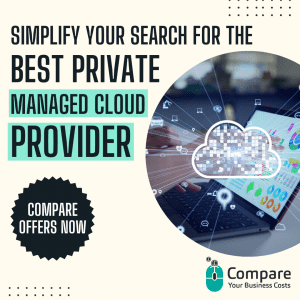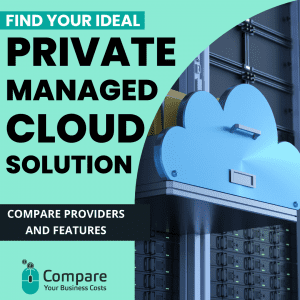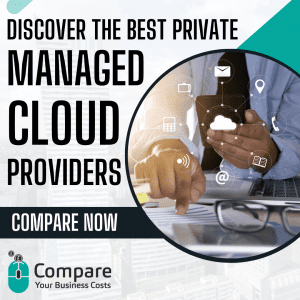
Enquire
Enter your details. It only takes one minute.

Compare
We compare the market to find you the best 3 quotes

Save
You receive your quotes directly from the provider
Private Business Managed Cloud Services
There’s no doubt that cloud services have helped businesses of all shapes and sizes manage their IT in more cost effective and efficient ways. It’s made things easy for start-ups and allowed large corporations to better control their costs.
As with any third party service, however, choosing the best for your individual business needs can be challenging. Fortunately, our cloud provider comparison tool, allows you to do just that.
If you’re confused about what you should be looking out for and whether colocation matters more or have difficulty understanding the difference between SaaS and IaaS, you’re not alone. With hundreds of companies to choose from, taking your time and exploring the possibilities has never been more important.
What Are Cloud Providers?
Cloud computing has developed exponentially over the last few years. Those who can remember the early to mid-noughties, will realise that accessing high quality IT services was a challenge, particularly for smaller businesses and start-ups.
The cloud is basically another term for the internet. It is the notion that you can manage all your IT needs remotely through your Wi-Fi or broadband connection. For example, cloud computing security means that your systems are continuously updated and protected without you having to physically upload software. Cloud storage options allow you to put files online and share them with individuals, wherever they are in the world, creating a flexible solution for collaboration. They also give you the chance to access important software at a much lower cost.
There’s no doubt that one of the key considerations for choosing a cloud service for your business is the level of security. The good news is that even small businesses can nowadays access high levels of protection as well as a whole host of useful software by migrating to the cloud.
Colocation FAQS
A colocation facility is a data centre facility in which businesses can rent space for their servers and other computing hardware.
Public cloud platforms offer users the benefit of paying only for the computing resources they consume rather than owning and running their servers. This model has become increasingly popular as businesses discover that cloud services can run many applications that were once too costly or complex for on-premise deployments.
Colocation is typically ideal for businesses with more internal IT resources or expertise to manage their data centre and servers. It also serves businesses with plenty of technical specialists on staff but doesn’t want to invest time and money into maintaining their infrastructure.
When choosing a data centre to colocate your data, ensure it has adequate physical security measures and is staffed by trained experts. This is especially essential if your business runs critical applications or sensitive information. Furthermore, look for a provider with a backup plan to protect your files in case of disasters.
One of the most crucial aspects of a colocation plan is bandwidth. With enough, data transfers may be faster and more manageable for your users. To combat this, ask your colocation provider about Dedicated Internet Access (DIA) or IP transit service, which provides dedicated bandwidth with symmetrical upload and download speeds.
Colocation users who require large data transfers often turn to DIA and IP transit for solutions. These connections offer more bandwidth than a broadband connection and can be utilised to route traffic between servers at lower costs than purchasing your bandwidth. With these services, you’ll always have the best internet connection possible.
Power is a significant factor in the cost of colocation. This includes electricity for running racks and heating/cooling equipment at the facility. If you choose a colocation facility that charges a premium for electricity, this cost will be passed along to you.
The cost of real estate and utilities will directly influence your colocation costs. A colocation centre in a city will typically be more expensive than one in a rural area.
The cost of travelling to and from a colocation centre can affect your monthly bill. If you have employees that need to be present at the facility, travel expenses could offset any savings you have made elsewhere.
Data safety is of the utmost importance for any business, so ensure you select a colocation host with multiple layers of security and compliance. This may include physical security staff and an onsite backup plan in case of natural disasters.
When considering colocation costs, one major factor is how much space your equipment requires. This can range from a few racks up to an entire suite. Knowing exactly how much room you require before signing any provider agreement will affect costs significantly.
Colocation prices typically do not include support. This is because the customer’s IT team must set up and maintain hardware on-site, though some providers provide managed service packages at an additional fee.
Colocation centres typically provide a range of bandwidth options, such as essential, blended and gigabit services. Furthermore, some can offer burstable bandwidth – an arrangement in which customers are charged based on average monthly usage for 95% of the month and then recalculated when more bandwidth than expected is consumed during the remaining 5%.
Colocation is becoming an increasingly attractive option for enterprises of all sizes, so companies must ensure their infrastructure runs optimally. To do this, they require a data centre that is reliable and energy efficient.
When searching for a colocation provider, plenty of options offer various services to their customers. To make the best choice for your business, choose one with competitive prices and terms.
Colocation providers may also provide features to make your business more successful, such as an emergency hotline, 24/7 customer service, or the capability to connect your website to a cloud server.
Although these aren’t the only features to look for when searching for a colocation solution, they can make all the difference between an average and an excellent experience. A quality provider may also provide additional services that simplify managing your environment, such as remote monitoring and alerts.
No matter which colocation service you select, it’s essential to remember that reliability and security are at the core of the experience. Finding a partner who can deliver these features is paramount for the success of your business.
Hosting through this type of provider is ideal for companies requiring a lot of computing power but needing help to purchase and operate their equipment. Furthermore, the provider provides backups so your data remains safe in a disaster.
Colocation has become an attractive option for businesses that require high capacity and quick responses to market challenges. Not only does colocation provide a low Total Cost of Ownership, but it also offers numerous other advantages that allow organisations to focus on their core operations.
In today’s digital transformation era, your IT infrastructure must be future-proof, agile and capable of meeting business objectives. A resilient and flexible data centre solution is critical to achieving this. A great way to do this is by renting or colocating in an established data centre.

Colocation Solutions: What You Should Know
A colocation facility is a physical data centre where companies rent server and computing hardware space. Typically, it provides power, cooling and bandwidth at reasonable rates; some may include security features.
When selecting a colocation provider, please consider its location, dependability and scalability. Consider looking into providers with multiple data centres to pick which best meets your requirements. Furthermore, some offer flexible leasing plans, which enable you to get better prices on monthly bills.
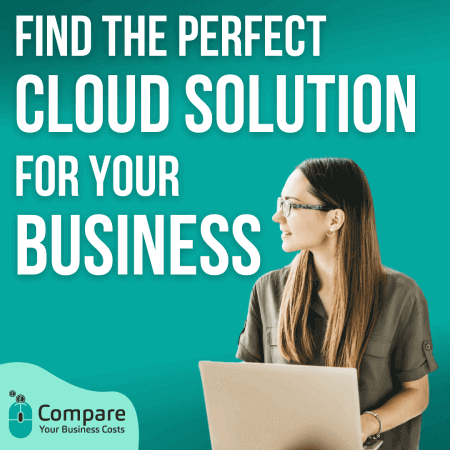
Colocation Services: What You Should Know
Working with a provider with multiple locations might be advantageous if your organisation has data centres worldwide. This will enable your team to remain close to their data centre and reduce travel expenses.
If your organisation has customers across different regions of the country, finding a provider with colocation facilities, there is essential. Doing so will enable you to deliver data quickly to those clients and keep the network fast and dependable.

UK Colocation Providers
Who Are AWS Cloud
AWS Cloud has quickly become one of the most popular cloud computing platforms due to its features that enable users to store and access their data easily; plus, it’s very straightforward to use and maintain.
Aws Web Services is a cloud platform offering various software and infrastructure services through a network of global data centres. This includes products and services related to cloud computing, virtualisation, the Internet of Things (IoT), and databases.
Features of AWS Cloud
- ECS is a pay-as-you-go service that permits renting resources such as virtual machines, or computing units called EC2 instances. These units can be created or destroyed and serve to run applications like servers, databases, and websites.
- The company’s pay-as-you-go model is an attractive solution for small businesses and startups that cannot justify investing in their IT infrastructure. Furthermore, the firm provides a free trial period for customers to try out its services without any financial commitment.
- Amazon provides a broad selection of cloud services tailored for different businesses and industries. These include software as a service (SaaS), platform as a service (PaaS), and infrastructure as a service (IaaS).
- AWS provides customers with several advantages, such as elasticity, cost savings and security. For instance, customers can utilise more computing capacity during high application traffic and scale down when insufficient demand exists.
- An additional advantage of the service is its range of payment options, such as pay-as-you-go and prepay. Furthermore, it provides volume-based discounts.
- Customers can save up to 75% on their on-demand costs when they reserve a certain number of EC2 instances for 12 months or longer. AWS also offers spot pricing, which allows customers to bid on available compute capacity that isn’t being used.
- AWS also provides networking tools to reduce latency and enhance performance. These include a cloud firewall, load balancers, and a gateway.
- Autoscaling can also be enabled, automatically adjusting compute usage based on user-defined thresholds. This process is beneficial in cases where businesses constantly alter their requirements or need to upgrade computing power in response to new device demands quickly.
Why Choose AWS Cloud
AWS is an ideal service for Internet of Things deployments, as it provides a robust selection of sensors and hardware that can be integrated with its infrastructure. Furthermore, AWS supports various programming languages and databases.
Other notable companies that have chosen AWS for their cloud infrastructure include Netflix and Unilever. By shifting to Amazon Web Services cloud platform, these firms were able to reduce their IT expenditures.
AWS boasts a vast customer base, boasting millions of active users across various sectors and regions. These include rapidly-growing startups, large enterprise companies, and top government agencies.

Who Are Microsoft Azure
Microsoft Azure Cloud is a collection of cloud computing services from Microsoft designed to make the development and deployment of apps faster. It includes tools for creating virtual machines (VMs) and cloud-based storage options that can store large amounts of data – including databases.
Features of Microsoft Azure
- The software-as-a-service model makes it simple for developers to create scaled applications without worrying about hardware and infrastructure requirements. These applications can use services like virtual machine storage, network traffic monitoring, and identity management.
- These cloud-based platforms allow organisations to manage and monitor their cloud resources from various devices. For instance, you can remotely access a server using your mobile device and see what it’s up to from anywhere.
- This can be especially advantageous for small businesses needing more IT staff or resources. Furthermore, organisations can ensure they adhere to privacy and security legal obligations if such laws exist.
- Another significant advantage of Azure is its scalability, which enables organisations to expand their IT capabilities as their business expands and they expand geographically. Furthermore, it offers endless disaster recovery options, giving businesses peace of mind that they can continue operating even during significant incidents that could last hours or days.
- Microsoft is the undisputed leader in cloud computing services. With a solid presence across the market and plans to expand its data centres globally, it has cemented itself as an industry leader.
- This highly integrated platform offers many features, from big data and machine learning to container support for IoT. Furthermore, it was the first public cloud to receive FedRAMP P-ATO certification – guaranteeing government agencies secure cloud resources for their operations.
Why Choose Microsoft Azure
Azure is often used to run virtual machines (VMs) and containers, host infrastructure components like DNS servers, and store data in relational and non-relational databases. These applications can be created using various tools, including the Visual Studio development environment.
Besides these applications, the service provides a range of other features like media and content delivery, cloud integration and server backup. These solutions enable businesses to deliver content quickly while safeguarding digital rights by encoding and distributing it to consumers.
These tools can also link private and public clouds, enabling seamless cross-platform integration with existing applications and services. Furthermore, these services help secure encryption keys and other sensitive information stored in the cloud.
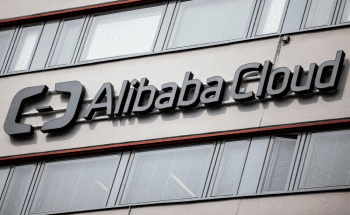
Who Are Alibaba Cloud Colocation
Alibaba Cloud provides infrastructure, platform, software, and artificial intelligence (AI) services. Additionally, it provides specialised offerings like E-MapReduce for enterprises to build and deploy cloud-based data management and analytics solutions.
Features of Alibaba Cloud Colocation
- Scalable Compute Capacity – Alibaba Cloud provides an elastic, cost-effective infrastructure to support growing and changing workloads. Its Elastic Compute Service (ECS) enables developers to scale their applications by deploying virtual servers tailored to their computing requirements. ECS supports various VM types, auto-scaling, load balancers and anti-DDoS protection.
- High Availability and Resilience – Alibaba’s global reach allows companies to deploy applications and data closer to customers, improving customer experience while reducing operational expenses. For instance, Alibaba’s Cloud Enterprise Network connects VPCs and VBRs across regions with guaranteed latency and bandwidth guarantees.
- Low Total Cost of Ownership – Alibaba Cloud offers competitive pricing plans and features for businesses transitioning to the cloud for the first time. Its flexible payment terms enable businesses to select a plan that fits their budgetary constraints, plus preemptible instances save customers money by avoiding paying for resources they aren’t using.
- Storage Options for All Use Cases – The cloud offers many storage solutions, from object storage to shared file storage and archiving storage. It can be used for storing any data securely and encrypted. These offerings provide unrivalled accessibility in the digital age.
- Content Delivery Network – Alibaba Cloud CDN is a high-performance content delivery network that can accelerate end-user content delivery. It supports all major internet service providers and provides enterprise-grade accelerated services over HTTPS.
- It provides a range of bandwidth-based plans tailored to fit any organisation’s requirements. Its scalable and reliable network infrastructure enables it to handle high traffic volumes with fast performance guarantees.
- Developing New Technology and Solutions – Alibaba Cloud is developing various new technology and solutions in addition to traditional cloud services. These include the Alibaba Cloud Security Center, which can detect and notify users about threats. It also has security tools to shield business operations from ransomware, viruses, and DDoS attacks.
Why Choose Alibaba Cloud Colocation
Alibaba Cloud, a newcomer to the cloud market, has invested heavily in building data centres and an international network. They’re also investing heavily in R&D, which has propelled their rapid growth; now ranked third globally behind Amazon Web Services and Google Cloud, Alibaba Cloud is poised for great things ahead.

Google Cloud Platform (GCP)
Who Are The Google Cloud Platform (GCP)
Google Cloud Platform (GCP) offers a suite of cloud computing services, including computing, storage, databases and networking. It operates in data centres worldwide to give customers access to computer resources on a pay-per-use basis.
Features of the Google Cloud Platform (GCP)
- Documentation – The documentation for GCP is excellent and packed with helpful detail to assist you with building an application. It has been organised intuitively, so locating the answer to your question is simple.
- Security – The Cloud platform boasts a highly experienced team of security professionals that monitor and protect its infrastructure. Furthermore, its in-built redundant backups guarantee the safety of user data.
- Support – Google Cloud offers two tiers of support – free, self-service, and paid options. For free support, Google engineers monitor StackOverflow and Google Groups; paid support includes phone support and a dedicated account manager.
- Big data – Google’s extensive data services allow you to process and analyse large amounts of information quickly. This makes them a popular choice for businesses seeking insights into their operations and customer behaviour.
- Compute – The Cloud Platform offers vast computing resources like virtual machines and containers. It’s an excellent starting point for those starting their cloud journey, with many advantages over its rivals.
- Storage – The Cloud Platform offers a range of storage solutions, from online file storage to database servers and analytics tools. Google Cloud Storage, its file storage solution, offers scalable and cost-effective options ideal for storing and accessing data.
- Database – Google Cloud Platform provides Cloud SQL, a database service that lets you deploy, manage and operate relational databases on its infrastructure. It includes features such as automatic data recovery, encryption and auditing.
- Support – The Cloud platform offers various tiers of support, with free self-service options included with every essential subscription. There are Google Groups and Slack channels for free self-service assistance; paid customers can access phone support and a dedicated account manager for personalised account management.
Why Choose Google Cloud Platform (GCP)
The Cloud Platform provides a vast array of services, which are constantly being improved to meet the ever-evolving demands of its users. With these resources, you can develop, test, and deploy your applications on the cloud.
Access these services using multiple methods, including the Cloud Console, a command-line tool and Google Cloud API. Each is user-friendly, secure and preconfigured for optimal performance on the Cloud platform.
GCP’s services model is ideal for businesses wishing to move some or all of their data centre applications into the cloud and create new ones. The cloud provides an excellent platform for building distributed applications that can scale up or down as needed.
One of the critical advantages of GCP is its global backbone network, which utilises advanced software-defined networking and edge caching services to guarantee fast, dependable, and scalable performance. Although this top-tier global network may come at a cost, it’s worth considering if your architectures require automatic routing across global networks via virtual private clouds (VPCs).

Oracle Cloud
Who Are Oracle Cloud
Oracle Cloud offers a comprehensive portfolio of cloud infrastructure, platform and data services to help organisations accelerate innovation. It enables customers to construct new applications within an expansive environment with built-in security and scalability.
Features of Oracle Cloud
- Network – OCI provides a network composed of IP addresses, routes and firewalls that can be configured to support private networks or public internet traffic. Additionally, it features a virtual overlay network (SOVN), providing end-to-end security.
- Compute – OCI provides virtual machines with various capabilities to meet various application needs. These can be rented as needed and configured to adjust automatically based on workload fluctuations.
- Storage – OCI offers object and block volume storage, which allows users to store unstructured data in buckets with elastic space usage. This enables users to pay only for what they use, with data redundancy assuring that data can constantly be retrieved.
- Database – OCI offers a database powered by Real Application Clusters, providing reliability and data security so users can quickly deploy real-time applications in the cloud. Furthermore, users can customise certain aspects of their database, such as granular control options or scalability requirements.
- Management – OCI offers services designed to enhance IT stability and DevOps effectiveness. These include security monitoring, orchestration, log analytics, content collaborations, and website and workflow management.
- Experience – OCI provides companies with a suite of cloud platforms that let them craft an immersive digital experience for their customers. This includes the Experience Cloud, enabling organisations to deliver a seamless, unifying experience across all customer touchpoints.
Why Choose Oracle Cloud
Oracle provides various cloud computing solutions, including network, storage, computing and database. These infrastructures can be utilised for running various applications like ERP systems, business intelligence tools and other mission-critical apps.
Oracle Cloud Infrastructure (OCI) combines high-performance computing with flexible networking to support cloud-native and traditional enterprise apps. Plus, OCI boasts a vibrant open-source partner ecosystem that assists customers in developing and deploying various applications.
Oracle Cloud relies on a vast network of partners to keep its offerings relevant and up-to-date. These partners also possess the resources necessary for users to succeed with their cloud initiatives, offering consulting, implementation, and technical support services.
AWS boasts an extensive network of partners that can offer the expertise to implement various cloud solutions.

Kyndryl
Who Are Kyndryl
Kyndryl, a spin-out from IBM, was established in November 2021 as an independent managed infrastructure services provider. It will specialise in the cloud, digital workplace and other IT solutions with a global delivery network spanning over 100 countries.
Features of Kyndryl
- Analyst View – According to a recent Morgan Stanley report, Kyndryl’s spinoff will enable it to focus on its core competencies without being dictated by its more significant parent. According to Morgan Stanley research, this should enable it to provide better service to customers and capitalise on its market-leading position as the world’s largest IT infrastructure services provider.
- Canalys analyst Alastair Edwards believes the move may make it easier for the spinoff company to collaborate with a broader range of technology vendors and not depend on IBM for every answer to customer questions. This could allow the spinoff company to be more adaptable when responding to customers’ needs while freeing itself from being the go-to vendor for specific solutions, according to Canalys’ Alastair Edwards.
- According to Kyndryl, separating Kyndryl from Managed Infrastructure Services will allow Kyndryl to better assist its clients in selecting and implementing hybrid IT solutions less dependent on IBM’s ecosystem.
- Kyndryl will gain from having an operating model focused on customer engagement and local expertise to deliver results. Furthermore, it will have more freedom in its hiring process, enabling it to select the most qualified personnel for its business – a critical element for its success.
Why Choose Kyndryl
Kyndryl’s business is increasing. It recently added Microsoft, Google and Amazon Web Services as new partners. It launched a mainframe extension enabling it to integrate its zCloud service with Microsoft’s Power Platform for low-code applications and workflow automation.
Recently, Kyndryl expanded its staff and hired over a dozen executives from outside IBM. These positions include senior positions in corporate affairs, strategy and development, finance, legal, and customer advisory. Furthermore, it poached several senior IBMers, such as Chief Transformation Officer Nelly Akoth and CFO Leigh Price.
Kyndryl has further strengthened its partnerships with software providers and other technology vendors, increasing its portfolio of technologies, capabilities and services to more than 60. These include Elastic, Lenovo, SAP, ServiceNow and VMware. Moreover, the company is forming alliances with EY, Field Safe Solutions, NetApp, Nokia and Oracle to enhance its managed IT services offering.
The company plans to add over 100 customers over the next six months and reach nearly 4,000 global relationships by 2022. It will specialise in selling managed services for multi-cloud environments; cloud services; application, data and AI services; network and edge services; security services; and digital workplace solutions. With its new operating model designed for flatter operations that are faster and more focused on driving profitable growth, this new strategy should drive profitable expansion further into profit.

Cloudian Cloud
Who Are Cloudian Cloud
Cloudian Cloud makes deploying cloud-native applications and managing data anywhere simple, with pay-as-you-grow S3 API management with zero lock-in and built-in analytics.
Media, healthcare or manufacturing businesses that manage data across hundreds of locations must invest in a multi-cloud infrastructure that integrates unified storage with data governance policies – that’s where Cloudian comes in.
Features of Cloudian Cloud
- Save up to 60% compared to traditional enterprise storage or public cloud, and enjoy the highest durability on the market at just 0.5C/GB/month.
- Cost Savings – Unlike the traditional enterprise storage acquisition cost per capacity unit that tends to increase with scale, object storage systems become less costly as you expand due to their peer-to-peer architecture.
- Robust Metadata Capabilities – Unlike NAS, which lacks comprehensive metadata, or SAN with limited tagging options, object storage systems offer robust metadata tagging capabilities. This enables organisations to track, protect and manage data at every stage of its lifecycle.
- Automate cloud and on-prem data management for efficient, cost-effective transitions to AWS, GCP or Azure with Cloudian’s public cloud data management tools. With these automated migration solutions tailored to your business requirements, you can automatically move your on-premise data into the cloud based on business requirements – with even a single namespace spanning both worlds!
- Manage your data between clouds with Cloudian’s built-in data management tools for AWS, GCP or Azure. Whether you need to back up to the cloud or move less frequently used data into the cloud for scalability, Cloudian’s cloud-native data management solutions make it simple.
- Secure your data with the highest levels of data immutability and security, certified by third-party government certifications, so that you can reduce both ransomware concerns and storage expenses.
Why Choose Cloudian Cloud
Cloudian HyperStore helps you store up to exabytes of unstructured data – both objects and files – in an infinitely scalable pool, all with ease and the industry’s most compatible S3 API. Available as either standalone software or fully integrated appliances, Cloudian HyperStore addresses your biggest storage challenges with ease and efficiency.
Cloudian offers a unified management framework that unifies all instances, so you can view your entire environment on one screen to detect storage and server metrics and user behaviour. Plus, with local support teams worldwide and professional services teams dedicated to keeping your storage running optimally, you can always count on Cloudian for reliable uptime.

Tencent Cloud
Who Are Tencent Cloud
Tencent Cloud is one of the world’s premier cloud companies, offering a broad selection of industry-leading cloud solutions. They make an ideal partner for organisations seeking to accelerate their digital transformation, foster innovations and secure competitive advantages in the future.
Features of Tencent Cloud
- Tencent Cloud Services is the only primary China-based public cloud provider with a global network of 25 countries and serving more than 1 million clients. Their service combines Tencent’s infrastructure-building capabilities with the advantages of having such a vast user platform and ecosystem.
- Tencent Cloud offers more than 300 cloud solutions and products, catering to various industries like financial services, education, healthcare amongst many others.
- With more than two decades of industry expertise, Tencent Cloud has developed cutting-edge C2B products and solutions that leverage its own consumer internet, messaging, audio/video/gaming technologies, as well as integrations with artificial intelligence, big data analytics and cloud computing innovations
- Tencent Cloud has also collaborated with leading global video streaming platforms such as Huya and Douyu to offer live-streaming and short video applications.
- Tencent Cloud’s next-generation Intel Xeon Scalable processors with Intel Deep Learning Boost and Optane persistent memory will allow it to continue providing innovative services and technologies.
Why Choose Tencent Cloud
Tencent Cloud, a global technology company with deep expertise and experience in messaging, mobile payments, music and video platforms, offers customers a secure cloud solution. Using Tencent Cloud’s service, customers can save time and money while addressing complex business issues head-on.
Tencent Cloud is confident of becoming a leader in AI-based intelligent video analysis and database cloud services. To do this, they are incorporating cutting-edge technologies and products into their core offerings for more diversified, differentiated, and efficient cloud services to the market.

OVHcloud
Who Are OVHcloud
OVHcloud is a cloud provider that offers business customers an array of solutions, from cloud-based solutions to bare metal servers. Established in 1999 by Octave Claba, it’s one of Europe’s largest cloud-hosting companies today.
Features of OVHcloud
- OVHcloud offers a comprehensive portfolio of bare metal servers, hosted private clouds, hybrid cloud and public cloud services that are easy to use, secure and scale. Its customers benefit from an industry-leading performance at cost-effective prices.
- The company provides top-notch web hosting services in multiple languages. Its user-friendly website has an appealing layout, making finding the ideal solution easy.
- OVHcloud provides web hosting and a suite of other services to enhance the online presence of businesses and other users. These include managed Kubernetes, data analytics and cloud management.
- OVHcloud’s infrastructure is built upon open-source software and hardware, providing its customers with high-performance, robust products. Plus, its services are supported by an experienced team of experts who help maximise their success.
- Its customer base primarily consists of small and medium-sized businesses and startups. Its hosting services offer comprehensive features and support, making it accessible even to newcomers.
- This French-based host provides various web hosting solutions, from shared to dedicated and virtual private servers. It boasts an expansive global network connecting its data centres, guaranteeing superior performance and dependability.
- OVHcloud platform is designed for maximum flexibility and scalability, making it the perfect solution for large-scale projects.
- Its API makes interacting with resources easy for users, while various interfaces enable them to work more efficiently.
- OVHcloud provides its customers with a guaranteed resource model that guarantees access to server resources when needed. This helps them manage large volumes of data while cutting costs.
- They provide an API that enables you to monitor and access your data and a suite of tools for training algorithms and accessing world-class predictive analysis. This makes it simple for your business to expand.
- OVHcloud’s global network is equipped with various security measures that safeguard its customers’ data against breaches and other malicious attacks. Furthermore, the company’s service is supported by experts who work tirelessly to resolve any issues quickly.
Why Choose OVHcloud
Cloud solutions this company offers are supported by a team of experienced specialists who assist customers in creating and growing their businesses. Not only that, but these professionals can offer support during any disaster and suggest improvements to improve operations.

DigitalOcean Cloud
Who Are DigitalOcean Cloud
DigitalOcean Cloud is a developer cloud that offers an array of offerings to enable developers to design and deploy applications. Its straightforward platform removes the complexity of deploying and scaling apps, while its extensive library of tutorials and open-source tools helps developers avoid common errors when crafting their projects.
Features of DigitalOcean Cloud
- DigitalOcean Cloud provides a range of cloud-based infrastructure, such as computing, storage, network and database services.
- Its platform features tools for efficient resource management and ecosystem integration.
- Droplets form the basis of DigitalOcean Cloud’s service offering and come in various configurations.
- Prices start from £5 per month and can instantly be scaled up or down from your dashboard. All Droplets come with free outbound data transfer, plus plans offer more RAM and virtual CPU cores for higher performance.
- These plans have many features, such as built-in CDN and S3 API compatibility.
- Other features that make it attractive to many businesses include an extensive documentation base, thousands of tutorials and a vibrant community of users who exchange knowledge.
- Developers can get started at a fraction of the cost of other cloud providers. With hourly and monthly billing, there are no hidden costs for additional traffic or fixed IP addresses.
- DigitalOcean is an attractive option for small teams that need to expand quickly without investing in expensive hardware. Its robust infrastructure is designed to support rapid expansion, with applications running on up to 10,000 virtual machines.
- They provide a suite of networking, developer and management tools to simplify creating and running cloud environments for teams. These include private networks, load balancers, DNS service, cloud firewalls and floating IPs.
- DigitalOcean’s platform is supported by an experienced team of engineers who work tirelessly to enhance the product and address customer requests. Together, they guarantee that DigitalOcean remains a top choice for developers seeking an affordable, reliable, fast cloud computing environment.
- Performance is the cornerstone of cloud computing for developers. According to independent testing, a fast platform means better applications and quicker development timeframes – which explains why DigitalOcean’s droplets have consistently been rated among the fastest on the market.
- High-performance infrastructures aren’t enough, however; what counts is a platform’s capacity for predictability and simplicity.
Why Choose DigitalOcean Cloud
DigitalOcean appeals due to its lack of hidden fees. Its pricing model is straightforward, so developers can get started with just enough capital for a project without worrying about complex calculators that make estimating usage difficult.

Linode Akamai Cloud
Who Are Linode Akamai Cloud
Linode Akamai Cloud is on track to become the world’s most distributed computing platform.
By combining Akamai’s expertise in infrastructure as a service (IaaS) and security services with Linode’s developer-friendly cloud capabilities, the new company will give developers an easier way to create and run their applications.
Features of Linode Akamai Cloud
- Akamai is the undisputed leader in digital experience, having been a partner in media, entertainment, technology, e-commerce, financial services and online games for decades. By joining forces with Linode, Akamai will make it simpler for organisations worldwide to power their applications across platforms, deliver content at scale and protect against cyberattacks.
- Akamai cannot reliably predict specific outcomes due to factors beyond its control, such as acquisitions or investments, changes in market conditions, competitive activities, economic and political instability, or other influences that impact revenue.
- The amounts and timing of these adjustments and any related income tax effect can differ significantly between periods due to factors outside Akamai’s control. Therefore, Akamai believes that including these adjustments in its non-GAAP results provides a valuable measure of its ongoing operating performance and helps investors better comprehend its core business results.
Why Choose Linode Akamai Cloud
.
The company has launched a distributed site program to provide basic cloud computing capabilities, such as virtual machines and database storage, in remote places worldwide. To begin with, 50 sites will be evaluated, with the potential for adding more sites down the line.
Linode plans to double its global infrastructure footprint by opening more than a dozen additional data centres worldwide, including Amsterdam, Chennai, Chicago, Delhi, Jakarta, Los Angeles, Miami, Osaka, Paris, Rome, Sao Paulo and Stockholm.
Once these data centres become operational, Linode’s entire product suite will be accessible. Customers can pick the compute capacity, network connectivity, storage, and other features best suit their workloads.

Rackspace Colocation
Who Are Rackspace Colocation
Rackspace Colocation is a new service that enables customers to deploy their hardware in rack space within Rackspace data centres. The offering aims to reduce the total cost of ownership while improving scalability, disaster recovery capabilities, and application latency and helping IT meet stringent security and compliance regulations.
Features of Rackspace Colocation
- Pricing – The cost of colocation is determined by several factors, such as how much rack space you require, your usage and electricity requirements. Prices can range from a few dollars to several hundred or more monthly.
- Rackspace offers colocation in its data centres around the globe. As one of the largest cloud service providers globally, it operates in more than 100 countries across Europe, Asia Pacific and North America.
- Established in 1995, this multinational company now operates across numerous countries worldwide. Its main office is situated in Virginia (USA), Chicago (USA), Dallas (USA), London (UK), Frankfurt (Germany), Hong Kong and Singapore are additional offices.
- If you are considering colocating your servers, Rackspace offers more than 500 data centres worldwide. Their network spans multiple continents and is protected by redundant systems to ensure maximum uptime.
Why Choose Rackspace Colocation
Rackspace is a leading global cloud computing provider dedicated to delivering true transformation as a service in applications, data, security and infrastructure. It offers various services like private cloud, managed hosting and dedicated servers.
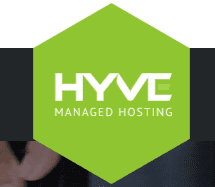
Hyve Colocation
Who Are Hyve Colocation
Hyve Managed Hosting, a UK-based hosting specialist, has recently opened a European headquarters in Frankfurt, Germany, to support their global cloud hosting services further. Offering tailored business support and private cloud, managed cloud and security solutions, Hyve allows customers to customise their infrastructure according to individual needs.
Features of Hyve Colocation
- Hyve has earned a reputation for providing clients with high-quality and cost-effective solutions. Their engineers become extensions of their clients, providing tailored 24/7/365 support and centralised management to ensure customer satisfaction.
- Established in 2001, Hyve is a premier global provider of fully-managed cloud and hosted server solutions. Their data centres are conveniently situated near significant business hubs worldwide to offer fast connectivity with enterprise-class security and resilience and numerous features designed to boost productivity.
- They are certified to ISO27001:2005 and ISO 9001:2008, with a well-deserved reputation for providing exceptional service to their clients. Furthermore, the company provides 24/7 support with engineers available on demand for emergency assistance when needed.
- Their Tier 3+ data centres are strategically situated in global business hubs, giving you access to top-class infrastructure. With guaranteed network uptime, low latency and power availability, you can rest assured that your business will receive full support.
- Hyve’s server line now includes Modified ORv3 offerings, enabling next-generation hyper scalers and colocation data centres to embrace industry-leading concepts with open standards. These modifications offer increased flexibility, ease of adoption and a more comprehensive range of system design options.
- The Hyve server line is built upon VMware software, HPE Blade Systems and 3PAR tiered storage arrays. It’s designed with flexibility in mind – it can be set up to run in multiple data centres for disaster recovery purposes.
- New data sources increase as technology evolves, and applications seek to turn them into strategic outcomes. From video and IoT to analytics, data centres are being inundated with unprecedented information.
- Hyve’s storage solutions are vital to its data centre strategy to help control this surge. Utilising VMware software, HPE Blade Systems and HPE3PAR tiered arrays, they provide an adaptable, scalable and efficient solution that enables organisations to store more than 1 petabyte of data.
Why Choose Hyve Colocation
Hyve’s mission-critical cloud-managed security and dedicated hosting solutions are backed by 100% uptime guarantees and delivered through its self-healing VMware cloud platform. With an experienced team of engineers onboard, Hyve-managed services are perfect for businesses that must keep their operations running smoothly while meeting ever-changing business requirements.

Virtus Colocation
Who Are Virtus Colocation
Virtus Colocation, a UK-based data centre operator, designs, builds, owns and operates mission-critical facilities within London’s metro area. It offers colocation solutions, high-density computing solutions, connectivity, cloud connect, digital security solutions, and support services to customers across various industry sectors.
the high performance needed to stay ahead in today’s highly competitive environment.
Virtus’ physical connectivity service will be enhanced with online real-time monitoring dashboards and self-service tools to help clients keep tabs on their data centres. This gives them the power to address any issues and guarantee their data remains secure quickly.
Features of Virtus Colocation
- The data centres are in the right locations – located in and around London’s metro
- They offer the best of traditional retail and wholesale colocation models
- Combining dedicated support and complementary ecosystems with low cost
- Scalable and custom solutions, in uniquely flexible and customer friendly packages
- Customers also benefit from Tier III certified facilities
- Ultra-secure facilities, protecting and connecting data applications
- Virtus has announced plans to expand its Slough and Hayes data centre locations by 76MW. They have collaborated with French contractor Bouygues on constructing five new buildings, which are expected to be completed by 2020.
- Virtus’ existing London and LONDON2 hyper-scale data centres, now fully operational, will be expanded by these new sites to a combined total of 150MW of power capacity. This expansion allows Virtus to double its portfolio size in London to 145MW as it continues investing in the region.
- As the demand for higher power density increases, so does the need for greater flexibility. Virtus has designed various custom data centre designs to accommodate any IT solution – from racks or cabinets in shared space to fully customised suites or data halls with dedicated power and cooling.
- Virtus provides its clients with a broad selection of connectivity options, such as physical fibre and connections to multiple global and national tier one and two providers. This ensures they get
Why Choose Virtus Colocation
Due to the growing demand for data from IoT devices, AI/machine learning and Big Data, organisations must ensure a safe and secure connection to the internet. That is why having an efficient data centre is so critical. Virtus has responded by expanding its portfolio of data centres to meet this growing need.

Zen Colocation
Who Are Zen Colocation
Zen Colocation provides secure data centre hosting for customers’ critical IT infrastructure. It offers shared and dedicated rack options to suit each customer’s requirements.
Features of Zen Colocation
- Remote hands service included.
- Dedicated or shared rack space.
- N+1 power, cooling and connectivity architecture
- Robust 99.999% network availability SLA
- 100% power availability SLA.
- 24/7 secure site access
- On-site technical support team available 24/7
- 1-hour ‘at rack’ SLA.
- On-site security team with 24/7 patrols and comprehensive CCTV coverage.
Why Choose Zen Colocation
If you want to move critical hardware off-site, but prefer to continue managing your infrastructure, Zen provides a cost-effective way to securely host business-critical IT infrastructure.

Exponential-e Colocation
Who Are Exponential-e Colocation
Exponential-e Colocation, a new business from Exponential-e, provides secure and resilient colocation solutions for enterprises’ network and cloud infrastructure needs. They offer a comprehensive suite of services to support customers’ IT infrastructures in their 71,500 square foot (1,625m2) data centre.
Features of Exponential-e Colocation
- North London’s colocation facility is a Tier III data centre with multiple layers of security, including biometric identification and combination codes. Furthermore, it has been fire-rated and NSI gold accredited for added assurance regarding its security.
- Exponential-e’s commitment to excellence and innovation required the data centre infrastructure to be solid and dependable. The 71,500 square feet (1,625m2) facility was designed with enterprise-class connectivity up to 10 Gbps, N+N redundancy on UPS systems, and N+1 for other critical services.
- Exponential-e’s 100 Gigabit Ethernet Layer 2 VPLS network and colocation facility are designed for superior resilience and performance, a cornerstone of their business model. This allows them to offer networking and cloud services across media, technology, finance, insurance and professional services, and the public sector.
- Exponential-e needed an efficient management solution for their colocation data centres, so they turned to ADVA Optical Networking’s Etherjack(r) solution. This solution allows data and voice traffic to be separated and monitored at the appropriate service level without sacrificing speed or dependability.
- With this capability, the iPDUs are managed through a web dashboard, enabling the team to efficiently perform bulk firmware updates and configure the devices from one location. This makes it simpler for them to address problems promptly.
Why Choose Exponential-e Colocation
In today’s digital world, enterprises must expand their IT infrastructure. However, the acquisition cost of necessary equipment and personnel may leave small to mid-sized businesses with few choices. Exponential-E Colocation – or hosting a customer’s IT infrastructure at another data centre – offers an affordable alternative.

Aspire Technology Solutions
Who Are Aspire Technology Solutions
Situated in the UK’s most resilient data centre at Gateshead Quays, Aspire Technology Solutions specialises in hosting and supporting businesses of all sizes. As a one-stop shop for all IT requirements – from the data centre, cloud and connectivity to professional services and cyber security – Aspire truly is your go-to provider.
Features of Aspire Technology Solutions
- The Aspire family’s flagship data centre in Gateshead is the latest addition, boasting cutting-edge technology with superior resilience and redundancy. Equipped with two dedicated electrical feeds from the national grid, you can rest assured knowing your data is always secure here.
- They are proud partners of some of the industry’s best, such as LightEdge, so you can rest assured that your data centre will receive only the finest and most cost-effective support and service.
- Aspire has an experienced team of IT specialists ready to support you with all your technological needs. Their friendly staff takes the time to understand your IT requirements and offer helpful suggestions.
- Aspire is an attractive workplace, offering a generous benefits package and encouraging collaboration, creativity and innovation. The company boasts an experienced leadership team and an ambitious vision for the future. Numerous exciting projects are underway – stay tuned to their newsletters or social media channels for updates!
Why Choose Aspire Technology Solutions
Aspire has always stayed abreast of the newest technologies and industry developments, so you can rest assured that your technology investment will be secure and efficient. Plus, as a partner to some of the top names in the business, like Network-i and LightEdge, Aspire ensures your data centre receives only top-notch support and service.
Business Cloud vs Data Centres
The old fashioned way of storing and handling information, files and other digital assets was to have an inhouse data centre. This could be anything from one computer to a whole network set up on the premises. This obviously had its drawbacks with regards to sharing information and expanding networks, often involving an investment in time as well as money to introduce new hardware.
With cloud based services, the data handling is done off-premises and all you need to access everything is a log-in and password. You can share files with someone halfway around the world and engage with your business without having to be in the office or working from a particular device.
The big difference between cloud services and a traditional data centre is that you essentially rent the space you need rather than invest in all the costly infrastructure. That means you can scale up and down as and when you need it and only pay for the services that you receive.
That doesn’t mean data centres have completely disappeared. While cloud services can exclusively be used by small and medium size businesses, others retain their data servers. The difference is that these are more likely nowadays to be handled through a colocation service that provides the infrastructure outside the business.
The Benefits of Business Cloud Services
The biggest benefits in choosing cloud computing providers over a static data centre include:
- A reduction in IT operating costs: You can access all the software and capability you need and don’t have to spend money on employing staff or installing hardware.
- Scaling your business: You can tailor the provision to both your current and future needs.
- You maintain business continuity because your IT is handled off-site, with all that protection that delivers.
- Your business will benefit from greater collaboration and flexibility in work practices. Files can be put in an accessible location giving staff the opportunity to work on a range of projects together.
- You also get automatic updates to all your systems without having to do anything. These processes can be expensive and time consuming to install manually in the traditional sense.
- If there is a catastrophic event such as a flood or outage, you can perform an online recovery for your data and other services without having to create that provision on site.
Finding the Best Managed Cloud Service
If you are looking to invest in a business cloud service, there are a number of parameters and options you will need to consider before settling on the right provider. As you might expect, there are different levels of service and cloud cost can vary depending on which you choose.
- For a start, there are several cloud storage options which include:
- Private Cloud: The services are managed for your business use only. This is a suitable model if you handle sensitive data and need to protect it.
- Community Cloud: This is a private cloud but where a number of different parties have access to the data or services. An example would be if you handled a number of franchises but want to give them access to certain data or information.
- Public Cloud: These services are accessed through a platform like Google or Microsoft and provide a good deal of flexibility as well as low cost. There is a question over greater vulnerability, however, but they are suitable for small business and start-ups.
- Hybrid Cloud: This allows you to access a mix of private and public cloud services to suit your needs. You may need higher security for some parts of your operational process but not for others.
In addition, there are three different models that are commonly used: Software as a Service (SaaS), Infrastructure as a Service (IaaS), and Platform as a Service (PaaS).
CRMs and online mailing services are examples of SaaS and are popular for small businesses that want to pick and choose what they need to operate in their sector. IaaS is a step up and allows you to rent your IT infrastructure and include services such as Amazon EC2 and Microsoft Azure. Finally, PaaS is a mix between the other two where you rent the space for your servers and also the software that you use. The reason for choosing this option is that it gives you more control over what you can do.
Get a Quote
What is Colocation (Colo)?
Colocation definition: This is a data centre where a business is able to store and operate both the servers and the hardware they need. This building handles the heavy lifting for your IT infrastructure including the physical security all of which means you don’t need to invest in the support infrastructure that makes on site installation expensive. Essentially, you provide the servers and they handle all the other maintenance that keeps your systems protected.
The Benefits of Colocation Service Providers
Colo is becoming increasingly popular for businesses that want their own servers but need a location to operate and store them. A colocation hosting service will keep your equipment maintained and provide high bandwidth levels. You also get the added security you need to protect your servers. Not all threats to data protection are online – physical hardware can also be a target.
A colocation service gives you the opportunity to store your servers in a safe, reliable location and achieve a high level of stability while keeping a strong hold on costs.
Colocation data centre pricing can vary depending on where it is situated. For example, colocation hosting in the UK has seen many businesses moving out from London, where services can be more expensive, to other cities such as Manchester where the operating costs are lower. If you are currently looking at your IT provision in respect of colo, it can be beneficial to look further afield if you want to reduce costs even further.
Private Managed Cloud Pricing
The cost of cloud services and other IT support can certainly vary considerably depending on what you are looking for to support your business. Colocation, for example, can be expensive if you limit your options to a large city like London where property prices and rents can often impact on overall costs. A smaller business or start-up may have limited needs when it comes to cloud services and might want to pick and choose packages and provisions from different companies rather than settle on one individual provider.
The good news is that many cloud service providers are offering flexible solutions for their clients which means you can add in or take away certain products and retain a reasonably tight control of the costs. As a start-up you may just need administrative or accounting software to support your business. As you grow, other provision such as CRM or product development aspects may need to be added.
What Business Cloud Services Do You Need?
Most new businesses and start-ups generally have little problem when it comes to cloud services. Their only challenge tends to be making a suitable cloud pricing comparison and getting the best deal for their requirements. After all, the key thing about cloud services is that they enable smaller businesses to compete on a more level playing field.
Established businesses will often encounter more problems simply because they have legacy infrastructure and approaches in place already and these will need to be replaced or incorporated into the new operational procedure.
here will be issues such as software compatibility and existing licences to take into account. There’s also the initial impact of migrating to the cloud, including how staff have to be trained and the cost that involves.
The one thing that you will need to navigate, whether you are a small business or a large corporation, is the number of cloud service providers out there. They vary from mega corporations such as Microsoft and Google to niche providers that offer more tailored or sector specific services.
There are a number of factors that you should take into account when choosing a business cloud service:
- Certifications and Standards: There are a range of certifications such as ISO which indicate whether the cloud service is appropriate for your business. Look for companies that have ISO 27001 and/or are members of the Cyber Essentials Scheme run by the government.
- Security: Probably top of the list for any business is how data in the cloud is kept secure. Doing your due diligence in this area is vital, particularly in respect of the new GDPR that came into effect this year.
- Compliance: Many industries and sectors will have standards and compliance issues that need to be addressed and your cloud service should meet these.
- The Best Cloud Fit: You will also need to look at how your current software and way of doing things fits with the cloud service that you are looking to employ. For example, if you are using a service like Office 365, it might be more beneficial to choose a system like Azure which you know is compatible.
- Support: It’s the bug bear of many consumers and companies but the help and support you receive from your cloud service is going to be vital. Most, of course, will tell you that there help line is the best in the world but until you try it out, you can’t be sure.
- Cloud Service Costs: While it shouldn’t be the only defining factor, you are obviously going to be concerned with the cost of your cloud service. This can be quite difficult to understand and comparing different companies can be more than a little confusing. There may be standard prices and costs for add-ons that make a big difference to what you eventually end up paying.
- Flexibility: Ideally you want a cloud service that can change and grow with your business. If you need to scale back or scale up, be sure that your cloud provider delivers this essential service and can be reactive to your needs.
Cloud Pricing Comparison
There is a lot to consider before you settle on the most effective business cloud service that fits your needs. There’s little doubt that choosing the right service can deliver huge benefits for businesses and organisations of all sizes. The good news is that our cloud pricing comparison tool can quickly and easily help you narrow down the choices.
James Ward is CEO and founder of CompareYourBusinessCosts.co.uk, a website that won the Prestigious ‘Website of the Year’ only in its second year of operations in 2015. The website has grown organically since then offering comparisons on over 20 different products including insurance, energy, telecoms, card machines, coffee machines and much more. James has a range of interests including horse racing, skiing, rugby and boxing. He splits his time between home family life, friends, exercise and socialising.





